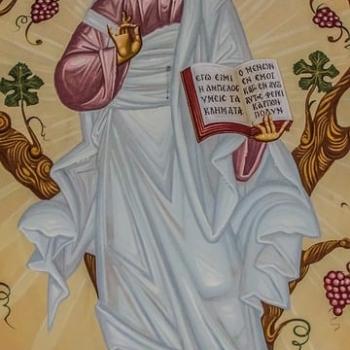
If theology is the systematic study of God, it is only natural that Catholic theology would investigate the relationship among the three persons of the Holy Trinity.
One such path of inquiry is called Spirit Christology. Spirit Christology approaches the subject matter with three presuppositions. First, it views Jesus’ divinity as a result of his relationship with the Father, mediated by the Holy Spirit. Second, it focuses on Jesus’ humanity without diminishing His divinity. Finally, Spirit Christology emphasizes the role of the Holy Spirit in the church and the world.
Spirit Christology: Meaning And History
In general, Spirit Christology refers to the study of if, how, and in what manner the person of the Holy Spirit influenced or affected the person of Jesus Christ and the work He has performed.
Forms of Spirit Christology can be found in the early Church as Christians recognized the Holy Spirit’s role in Jesus’ life. Some Church Fathers, like Irenaeus, sought to emphasize the Holy Spirit’s role in uniting humanity with God through Christ.
Nevertheless, Spirit Christology, as a distinct theological framework, developed later, particularly within Pentecostal and Charismatic movements. Contemporary Spirit Christology seeks to understand Jesus’ ministry as empowered by the Spirit and emphasizes the continuation of spiritual gifts in the present.
Christology And Spirit. A Definition Of Terms
Spirit Christology is a combination or amalgamation of two separate theological subjects: Christology and the doctrine of the Holy Trinity. Therefore, explaining what Catholicism means by Christology and the doctrine of the Holy Trinity seems beneficial.
Christology is that subset of theology that deals with Jesus Christ specifically. To its full extent, Christology is concerned with the doctrines involving both the person of Christ and His works.
The Holy Trinity and the doctrine that seeks to explain it is foundational to the Catholic faith. One of the most comprehensive statements explaining the Trinity comes from the Eleventh Synod of Toledo in Spain in 675.
“We confess, and we believe that the holy and indescribable Trinity, Father, Son, and Holy Spirit is one only God in His nature, a single substance, a single nature, a single majesty and power.
We acknowledge the Trinity in the distinction of persons; we profess Unity because of the nature or substance. The three are one, as a nature, that is, not as a person. Nevertheless, these three persons are not to be considered separable since we believe that no one of them existed or at any time affected anything before the other, after the other, or without the other.”
While the Trinity is often a source of confusion, it can be understood if one realizes that nature refers to what a thing is, while person refers to who a thing is. Applying this to the Trinity, Catholicism asserts that one divine nature is shared by three persons: the Father, the Son, and the Holy Spirit.
Spirit Christology In Scripture
Evidence of a Spirit Christology can be discerned by examining three events recorded in the Bible.
First, Spirit Christology emphasizes the Holy Spirit’s role in anointing Jesus as the Messiah. This is done first by observing the role the Holy Spirit has in the conception and birth of Jesus. An example is Luke’s account of the Annunciation. The angel tells Mary, “The Holy Spirit will come on you, and the power of the Most High will overshadow you.” (See Luke 1:35).
The Holy Spirit’s presence is also crucial in understanding the baptism of Jesus. All three synoptic gospels record the baptism of Christ by John the Baptist. Of particular importance to Spirit Theology is the descent of the Holy Spirit. “After all the people had been baptized and Jesus also had been baptized and was praying, heaven was opened, and the Holy Spirit descended upon him in bodily form like a dove.” (See Luke 3:21-22).
The third example is the belief that Jesus performed miracles, taught, and proclaimed the Gospel through the power of the Holy Spirit. Put differently, Spirit Christology asserts that the Holy Spirit enabled Christ to fulfill his messianic role. Support for this proposition is found in Saint Paul’s letter to the Romans. “If the Spirit of the one who raised Jesus from the dead dwells in you, the one who raised Christ from the dead will give life to your mortal bodies also, through his Spirit that dwells in you.”
Criticism
Theology is a peer-reviewed field with an attending capacity for criticism.
One such critique of Spirit Christology is that it seeks to replace the traditional Logos theology with a modalistic or unitarian model. Logos theology affirms a unity of the Holy Trinity: one God in three divine persons.
Modalism argues that there is one God who appears in different forms or modes. As such, Modalism denies the personhood of the Holy Trinity and is considered heresy.
A unitarian model of God denies the divinity of Christ. Instead of God, Christ becomes a human whom God inspired to save humanity from its sins. From a Catholic perspective, the unitarian model presents significant soteriological problems that make it irreconcilable with Catholic theology.
Ultimately, most criticism of Spirit Christology concerns the theory’s propensity to hyper-emphasize Christ’s humanity to the detriment of His divinity.
Conclusion
Theology seeks to understand an unfathomable mystery: God and the divine nature. Catholic theology adds the mystery of the Holy Trinity to the discipline of theology. For the most part, Christianity has accepted a Logos Christology, which emphasizes Christ as the Logos or reason of God.
In this paper, I have examined another theory called Spirit Theology, which seeks to emphasize the role that the Holy Spirit has on Jesus and His redemptive work.














